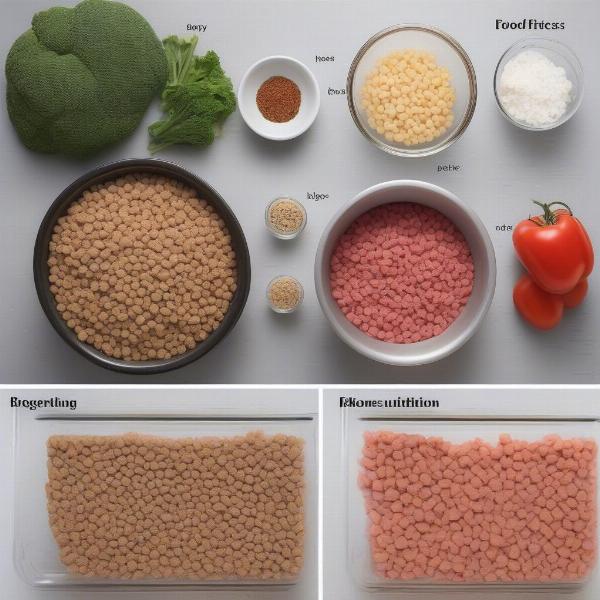The phrase “where more hot dogs are sold” likely rings a bell for anyone who enjoys a good NYT crossword puzzle. While the answer might be “ballparks,” this article goes beyond the simple solution and explores the fascinating world of dogs, specifically focusing on their nutritional needs. We’ll discuss what dogs should be eating, rather than what humans might enjoy at a sporting event. While a hot dog might be a tasty treat for us, it’s not the best choice for our canine companions. So, let’s dive into providing the best possible nutrition for our furry friends.
Decoding Your Dog’s Dietary Needs
Understanding your dog’s nutritional requirements is crucial for their overall health and well-being. Just like humans, dogs need a balanced diet that includes proteins, fats, carbohydrates, vitamins, and minerals. However, the proportions and sources of these nutrients differ significantly from our own needs. A dog’s digestive system is designed to process a diet primarily based on animal protein.
Proteins are essential for building and repairing tissues, while fats provide energy and support healthy skin and coat. Carbohydrates offer a readily available energy source, and vitamins and minerals are vital for various bodily functions. Feeding your dog a diet lacking in these essential nutrients can lead to health issues like obesity, skin problems, and even organ damage.
Choosing the Right Dog Food
The pet food market is overflowing with options, making it challenging to choose the right one for your furry friend. From dry kibble to wet food, raw diets, and home-cooked meals, the possibilities seem endless. When selecting a dog food, consider factors like your dog’s age, breed, activity level, and any existing health conditions.
Always check the ingredient list and look for high-quality protein sources as the primary ingredients. Avoid foods with fillers, artificial colors, and flavors. Consulting with your veterinarian can also provide valuable guidance on choosing the most appropriate diet for your dog’s specific needs.
Homemade Dog Food: A Growing Trend
More and more dog owners are turning to homemade dog food to have complete control over their pet’s diet. While this can be a great way to ensure your dog receives optimal nutrition, it’s essential to do your research and consult with a veterinary nutritionist.
 Preparing Homemade Dog Food
Preparing Homemade Dog Food
Creating a balanced homemade diet for your dog requires careful planning and consideration of their specific nutritional requirements. It’s crucial to ensure the diet includes the correct proportions of proteins, fats, carbohydrates, vitamins, and minerals to prevent nutritional deficiencies.
Conclusion: Prioritizing Your Dog’s Nutritional Well-being
While “where more hot dogs are sold” might lead us to ballparks, our focus here is on ensuring our canine companions receive the nutrition they need to thrive. By understanding their dietary needs and choosing the right food, we can contribute significantly to their overall health, happiness, and longevity. Remember to consult with your veterinarian for personalized advice and always prioritize your dog’s well-being.
FAQ:
- What are the essential nutrients for a dog’s diet? Dogs need proteins, fats, carbohydrates, vitamins, and minerals.
- How do I choose the right dog food? Consider your dog’s age, breed, activity level, and health conditions. Look for high-quality protein sources and avoid fillers.
- Is homemade dog food a good option? It can be, but consult with a veterinary nutritionist to ensure a balanced diet.
- What are the signs of nutritional deficiencies in dogs? Signs can include weight loss, skin problems, dull coat, and lethargy.
- How often should I feed my dog? This depends on age, breed, and activity level. Consult your veterinarian for guidance.
- Can I give my dog table scraps? Some table scraps are safe, but many are toxic to dogs. Consult your vet.
- What are some common dog food allergies? Common allergens include beef, chicken, dairy, wheat, and soy.
ILM Dog is your trusted partner in providing comprehensive and reliable information on dog care and breeding. We cover a wide range of topics, from breed selection and health care to training, nutrition, grooming, and much more. Whether you’re a seasoned dog owner or just starting your journey, ILM Dog offers expert advice and practical tips to help you provide the best possible care for your furry friend. For further assistance, feel free to contact us via email at [email protected] or call us at +44 20-3965-8624. Learn more at ILM Dog.